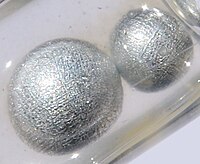
Photo from wikipedia
Global agricultural intensification has prompted investigations into biostimulants to enhance plant nutrition and soil ecosystem processes. Metal lactates are an understudied class of organic micronutrient supplement that provide both a… Click to show full abstract
Global agricultural intensification has prompted investigations into biostimulants to enhance plant nutrition and soil ecosystem processes. Metal lactates are an understudied class of organic micronutrient supplement that provide both a labile carbon source and mineral nutrition for plant and microbial growth. To gain a fundamental understanding of plant responses to metal lactates, we employed a series of sterile culture-vessel experiments to compare the uptake and toxicity of five metals (Zn, Mn, Cu, Ni, and Co) supplied in lactate and chloride salt form. Additionally, primary root growth in plate-grown Arabidopsis thaliana seedlings was used to determine optimal concentrations of each metal lactate. Our results suggest that uptake and utilization of metals in wheat (Triticum aestivum L.) when supplied in lactate form is comparable to that of metal chlorides. Metal lactates also have promotional growth effects on A. thaliana seedlings with optimal concentrations identified for Zn (0.5–1.0 µM), Mn (0.5–1.0 µM), Cu (0.5 µM), Ni (1.0 µM), and Co (0.5 µM) lactate. These findings present foundational evidence to support the use of metal lactates as potential crop biostimulants due to their ability to both supply nutrients and stimulate plant growth.
Journal Title: Biomolecules
Year Published: 2021
Link to full text (if available)
Share on Social Media: Sign Up to like & get
recommendations!